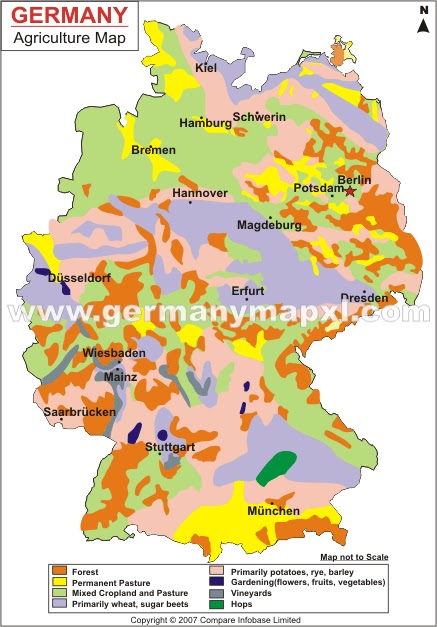Learning about Germany
- There
are 16 states in Germany: Baden-Wurttemberg, Bavaria, Berlin, Brandenburg,
Bremen, Hamburg, Hesse, Mecklenburg-Vorpommern, Lower Saxony, North
Rhine-Westphalia, Rhineland-Palatinate, Saarland, Saxony, Saxony-Anhalt,
Schleswig-Holstein, Thuringia. Three of the states are actual cities
(Bremen, Hamburg, and Berlin) and the capital of Germany is Berlin.
- The
German Political System is made up of two major parties. The Christian Democratic Union (CDU) and
the Christian Social Union (CSU), which represent the centre-right, and the
Social Democratic Party (SPD), representing the centre-left. There are three other parties
represented in the Bundestag: The Free Democratic Party (FDP), the Green
Party, and the Left Party (Pirates).
The head of the government is the Chancellor, who at this time is
Angela Merkel of the CDU party. She
is also the first female to be Chancellor of Germany.
- Dance
& Fine Arts. We learned about
Pina Bausch, Wim Wenders, and Richard Wagner. Pina died during the making of a 3D film
by Wenders. Pina had a unique way
of expressing words and meanings in dance; such as love, power, beauty,
joy, freedom.
- All
Quiet on the Western Front – This was a book about a German soldier during
WWI. The book gave me perspective
of what it was like to be a soldier during the time. The main character is Paul Bremer. His comrades are mostly his school pals,
but there is an older mentor to Paul whose name is Stanislaus Katczinsky,
or Kat. He is my favorite character in the book. I enjoyed his caring manner, his ideals
on life, and his ability to be self-sufficient.
- German
Culture was discussed in the 18, 19 and 20th centuries
regarding topics of Industry & Business; Fine Arts, Music, Theater,
Dance; Literature; Media; Role of Women; Health; Sports & Health. Much information was given about these
topics - too much to list - however, I will comment that it was
interesting to learn about famous people from Germany, the many inventions,
and firsts this small country had on the world.
- Youth
Culture – The movie “Berlin Calling” depicted the life of a young DJ, Ickarus,
who seems lost in life. He takes
many kinds of street drugs and ends up in a rehab clinic where he
struggles to get a hold of his life.
In the end, it appears he is on the right path, but the movie
leaves you questioning whether he goes back to drugs.
- Der
Baader Meinhof Komplex – this movie tells of the Red Army Faction (RAF),
which started in 1970 in Germany.
The RAF was a movement of young adults trying to change Government from
its current state of fascism. The
group was in existence until 1998.
- German
Food –I found it interesting that Pizza is very popular, and not just
pepperoni pizza, lots of different toppings are put on pizza. Another very popular food is Doner. We also talked about German Christmas
cookies and Stollen. Food is a main
determinant of any culture and most of us are already familiar with some
type of German food. But just
because we have German restaurants in the states, doesn’t mean we’re
eating authentic German food.
Personal Comments:
What a great class to take. I even learned how to blog! I enjoyed the idea of not following strict rules. Presentations and blog posts were left to our own creative minds. And by allowing that, I saw a lot of different ideas of teaching a class. Thanks Professor Specht-Jarvis for the added humor and making the class entertaining.











